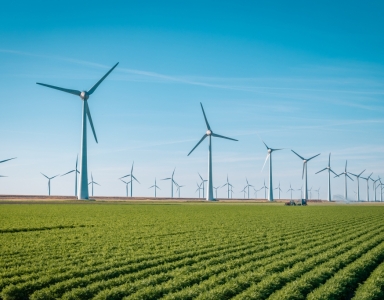Will the war in Ukraine accelerate the energy transition? – Part I
Russia’s invasion of Ukraine painfully exposes Europe’s dependence on Russian gas and other raw materials. There is now a strong political call to transform the current energy system into one based on cheap, renewable and reliable energy; a new energy system. Alternatives and new raw material producers and suppliers are currently in high demand, and an acceleration of the EU Green Deal is also on the table. The current developments are therefore an excellent time to take decisions for both the short and long term. This requires a careful analysis of the current approach but also a reassessment of the geopolitical perspective.
The choices that will be made in the upcoming period will have major consequences for the European energy transition. Hezelburcht takes a critical look at these developments and what they may mean for the subsidy landscape and the financing of sustainable alternatives. In Part I of this series, we take a closer look at how Europe has become dependent on (Russian) gas in the first place.
The energy trilemma
The drive to become and stay independent of Russia and move towards a self-sufficient and renewable energy system is not new. It has been a major topic of discussion for at least more than a decade. In retrospect, it is easy to see that Europe has fallen behind in its independency regarding this topic, but for now we must look to the future. For that, it is important to understand the reasons why Europe has fallen behind and to take these reasons into account in future policy. A basis for this analysis is to look at the stability of our current energy system, which depends on three criteria known as the Energy Trilemma:
- Security of supply
- Cost
- Environmental impact
What does the trilemma entail?
Criteria 1 and 2 used to be arguments for maintaining oil and gas supplies; it could be supplied almost continuously and it was relatively cheap. Long-term prices remain difficult to predict, but the fear of security will weigh much more heavily on the balance sheet. The third criterion has unfortunately also played a minor role in recent years. Over the past decade, the ETS price (cost per tonne of CO2 emissions) has been low, so there has not been a strong incentive to ‘go greener’ and invest in renewable energy sources, energy efficiency, electrification and other sustainable solutions.
Especially compared to ten years ago, various renewable energy sources were too expensive. However, important (technological) steps have been made. For example, the costs of (offshore) wind and solar PV have been drastically reduced (whether or not thanks to the various subsidy programmes!) and only in recent years have they become truly competitive in relation to the production of grey electricity. All in all, this has led to gas being seen as an important transition fuel, even by the European Commission (EC).
Energy Transition
Recent developments underline once again the field of tension between the criteria of the energy trilemma and the associated limitations and challenges. Striving for more sustainability, for example, can put pressure on the other criteria and vice versa. It also shows why the energy transition has seen so much resistance so far. Nevertheless, it is important to ensure independence with a diverse range of energy sources. This way, Europe will be less dependent on one country or energy source in the future. There is nothing wrong with reciprocity among countries; it is important to a certain extent for the stability of Europe. However, it is even more important that a balance is found in this respect, something which is currently lacking.
Where to go from here?
New energy alternatives need to be developed even faster if Europe is to reduce its dependence on Russia in the long term. In part II (soon online), we will elaborate on a number of plans and programmes with which the European Commission wants to achieve this in both the long and short term.
Do you have any questions about this article? Specialist Dr Bram van Weerdenburg would be happy to talk to you about the consequences of the war for funding opportunities. Please contact him at b.vanweerdenburg@hezelburcht.com or call 088 495 20 00.


